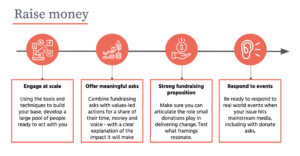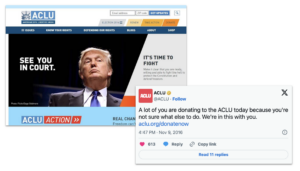The upcoming UK general election might not seem like an obvious fundraising opportunity for charities. But with the right approach you really can harness the energy and emotion of an election cycle to inspire your supporters and raise money.
In this blog, we look at the things you need to put in place to make a strong case for donations and maximise the amount of money you can raise.
This is the third in a four-part series sharing the strategies, tools and tactics we covered in our February webinar (watch the replay here). The full blog series covers:
- Goal 1: Building your base
- Goal 2: Raising the profile of your cause
- Goal 3: Raising money
- Goal 4: Achieving impact
Raising money
To deliver services and run campaigns, charities need to raise money. An election provides a good answer to the question ‘why now?’, and we can learn a lot from the political parties about recognising donating as a core part of campaigning.
You can also develop strong fundraising asks to show why donations are critical during the first 100 days of a new government.
Here are four steps to raising money during an election:

1. Engage at scale
Using the tools and techniques we’ve outlined to build your base, develop a large pool of people who are ready to act with you. This is the first step to successful fundraising, ensuring you have lots of supporters who are ready to give.
2. Offer meaningful asks
Combine fundraising with values-led actions for a share of people’s time, money and voice – with a clear explanation of the impact it will make.
Keep people engaged by sending regular weekly (or more) emails with different ways they can take action for your cause.
3. Strong fundraising proposition
Make sure you can articulate the role small donations play in delivering change.
Craft your fundraising proposition carefully, as this makes a huge difference to whether people will donate. And run tests to find out which framings really resonate with your audiences.
You’ll also need to be ready to react quickly with a donation ask when your issue hits the headlines.
4. Be ready to respond to events
For charities, when your issue is in the spotlight you can offer an alternative to political promises through the direct, tangible work you do with or for affected groups.
If you’re not registered under the Lobbying Act, you can even use that as part of your proposition, by explaining how supporters’ donations will help you come back stronger after the election.
Learning from political fundraising
We can take valuable lessons from political fundraising during elections here too.
What parties often do really well is to show how giving money is a form of activism. At election time, it’s the most meaningful thing people can do to help them win – and that’s a compelling proposition.
The built-in deadline of an election adds urgency, which we can use too.
Case study: ACLU comes out fighting
When Donald Trump was elected US President in 2016, the American Civil Liberties Union (ACLU) raised nearly $1 million in 24 hours with a compelling and bold proposition.
Although this was a very specific context, it was a masterclass in effective fundraising that offers many transferable lessons.
By saying ‘we’re in this with you’, the ACLU connected to people’s emotions and leant on shared values. Crucially, they gave people something tangible they could do in response to Trump’s win, and a clear role for their money.
Of course, a 2024 Labour election win here would be very different. But charities can still react fast, say clearly what they’ll be doing in the first 100 days, and explain how people’s donations can help to achieve it.
Next: Read blog 4 – Using digital to achieve impact. >>Get in touch
Get in touch
These are some of the key digital strategies, tools and tactics we think can help you achieve your goals around the general election.
We’re already working with partners right now to make this happen for them, and we can help you work out what to prioritise, and how much time and budget you might need.
So if you’re keen to hear more about anything, do reach out for a chat.
Q&A
During our live webinar, we had loads of insightful questions about raising the profile of your cause and raising money during a general election. Here’s a quick overview of answers from Forward Action’s CEO, Berry Cochrane, and Strategy Director, Helen Hector.
Q: Conversion to fundraising from campaigning or mobilisation asks can be challenging. Outside of the proposition, what can we do to drive this and get people converting faster this year?
Helen: The proposition and narrative you build to link these things together is so important, and worth investing some time in. We’ve helped organisations step back and create movement stories that centre the supporter in your mission, as an active player who can help you achieve your goals in different ways. The more tangible you can be about how donations fuel change – whether that’s by the services you deliver, the government policies you influence or the other supporters you can recruit – the better.
But outside of that we know tactics like crowdfunders for specific and reactive asks, lifting the lid on what’s happening inside your organisation, and testing your donation prompts with lower asks for people who’ve never donated before all do well for conversions.
Q: Would you recommend including emails without an ask occasionally, just focused on thank you and impact?
Helen: We always advise putting an ask in every email. I think saying thank you and showing people’s impact are really critical things your email programme should be doing. But we often find that when you talk about impact or say thank you, then pivot to an ask, that’s where you can see your biggest returns. When people can see their impact, it motivates them to give. So always include a PS or something at the bottom that gives people a way to show their support again.
Q: You said one email per week – how many weeks long should a journey be?
Helen: As a rule, we say your supporters should be receiving an email a week all year round, if you’ve got the resources to do that. Mix those asks up – obviously you can have specific campaigns and automations that focus on particular areas at any one time. Bring your whole organisation into that conversation about what’s the most important thing we can tell a supporter this week.
